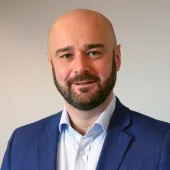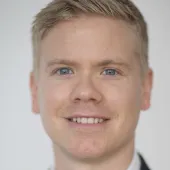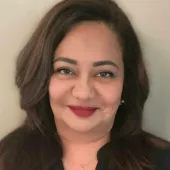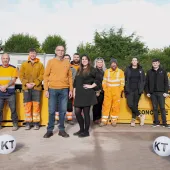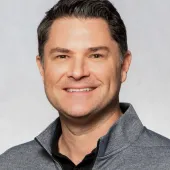First Female Master in the UK Marine Aggregates Sector

First published in the May 2016 issue of Quarry Management as Breaking the Mould
Georgina Carlo-Paat, the first female Master in the UK marine aggregates sector, talks to QM about her rise to the top of her profession and the need to encourage more people, especially women, into the mineral extractives industry
When Georgina Carlo-Paat became the first woman Master in the UK marine aggregates dredging sector and completed her first tour of duty abroad the CEMEX UK dredger Sand Heron late last year – it challenged the myth that the mineral products industry is very much a man’s world.
Indeed, times have changed. Georgina is in command of one of four CEMEX dredgers that operate in waters around the UK and near continent, which provide approximately 18% of the company’s UK aggregates output. She joined CEMEX in April 2015 and was appointed to her current role after successfully completing comprehensive training and induction to the world of aggregates dredging.
‘It was absolutely thrilling to be the first woman Master in the UK marine aggregates sector,’ said Georgina. ‘Of course, being in charge of the Sand Heron carries many responsibilities. I have to ensure that CEMEX’s network of wharves, along the South Coast and in London, is supplied with the right marine materials to service our customers.
‘As part of CEMEX’s safety management system, I have a duty to ensure not only the overall safe operation of my ship, but also the health, safety and welfare of all employees, contractors, customers and the general public. My role also involves fulfilling CEMEX’s environmental policies at sea, which include supporting the sustainable management of the UK waters and protecting the marine life and environment.’
She continued: ‘Every day is completely different and it’s a real privilege to be working for such as well-respected and forward-thinking organization at the forefront of supplying marine aggregates to the UK and European construction industries.’
Georgina is no stranger to the maritime industry. Prior to her current role with CEMEX, she was temporary chief officer for Stena Line (part of Stena AB), one of the largest ferry operators in the world. Her first job at sea was in 1990 as a cook on the USS Gopher State (American cargo ship), but it was not until she returned to the UK that she had aspirations to become a captain in the Merchant Navy.
‘When I got back home I wrote letters to every shipping company that was out there,’ recalled Georgina. ‘Eventually, I got my break with one company and so I started my SSTG [Ship Safe Training Group] deck cadet training in 1992 and worked my way up to each rank.
‘In 2004, I gained my unlimited Master Mariner’s certificate which means I’m qualified to command all types of commercial vessels anywhere in the world. It’s the pinnacle for any mariner to achieve. And I’ve been able to take charge of everything from specialized tankers and cargo coaster ships to the world’s biggest ferries and cruise ships.’
One of the key motivational factors for Georgina joining CEMEX was the opportunity to juggle her family life yet still rise to the top of her profession.
‘The ship routine in my last job was to work onboard for one week and then take the following week off, which really did not fit around my family life,’ she explained. ‘I have a two-year-old son and my husband works at sea too, so it was very difficult to find some sort of work-life balance.
‘Working for CEMEX, I now have a much more flexible shift pattern. I’m onboard for three weeks and off duty for another three weeks, which has allowed me to strike the right balance between my work and life at home.’
One of the biggest challenges facing the mineral extractives and processing sectors is addressing the skills shortfall over the next few years – and Georgina believes the industry needs to get the message across to young people looking at potential career paths that quarrying is full of exciting and rewarding opportunities.
‘I love my job and being the first woman Master in the marine aggregates sector has certainly broken the glass ceiling, so I would encourage more people, particularly women, to consider this profession,’ she commented. ‘However, we need to change the way the industry is viewed and open up a whole new world of opportunities for young people, especially as quarrying has been an area that has never crossed their minds before.
‘There are so many and varied jobs that make up the sector and we need to show the next-generation of talent that a career in quarrying is fulfilling, well paid and rewarding.’
CEMEX clearly value employees as their most important assets and have launched a number of initiatives (eg Driver Apprenticeship Scheme) to help bridge the critical skills shortages throughout the industry. The company’s strong commitment to staff training, development and recruitment will help ensure it has a fully trained, competent and professional workforce to meet the growing demands of the wider construction industry.
Georgina’s success story at CEMEX demonstrates that the quarrying sector is opening doors for women and breaking down the gender barriers that have prevented them from taking an active role in the industry.
‘CEMEX already do a huge number of things very well,’ said Georgina. ‘Before applying for the job, I did my research and asked a friend – a former employee at the company – what it was like working for them. Everything he said about CEMEX was positive, from the camaraderie to the good working relationships. And the company’s stance on safety, skills development, continuous training and sustainability is truly admirable.’
She added: ‘With a skills shortage being experienced across the aggregates sector, there is a real push to get more women into the industry because there is no reason why they can’t do the same jobs as men. Look at me; CEMEX offered me the job based on merit and my qualifications.’
While maritime and quarrying are both traditionally male-dominated industries, Georgina said that – based on her own experiences – women should not be afraid about the gender imbalance, but should be positive about what the future holds, fulfil their potential and thrive in whatever career they choose in those sectors.
Georgina’s successful career is a prime example of what can be achieved and it is probably safe to say there is ‘girl power’ on board her ship.


